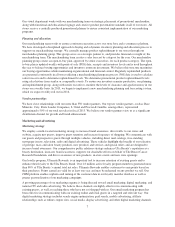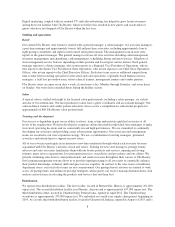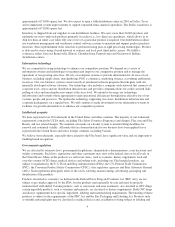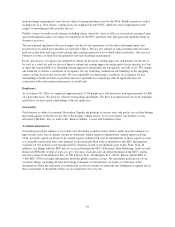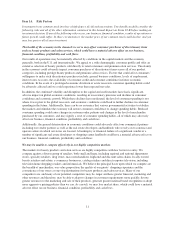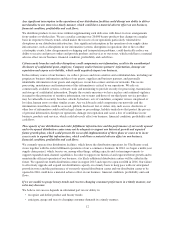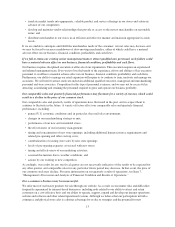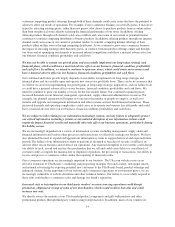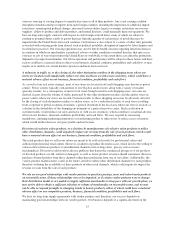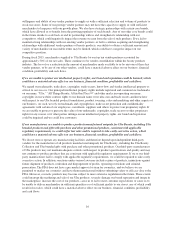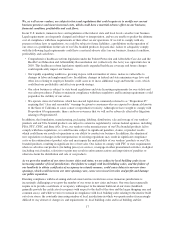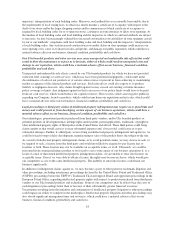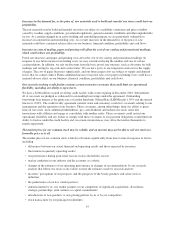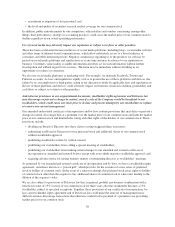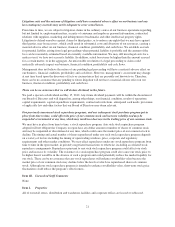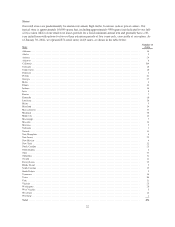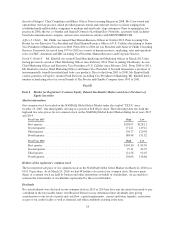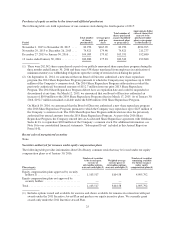Ulta 2015 Annual Report Download - page 21
Download and view the complete annual report
Please find page 21 of the 2015 Ulta annual report below. You can navigate through the pages in the report by either clicking on the pages listed below, or by using the keyword search tool below to find specific information within the annual report.overseas sourcing to varying degrees to manufacture some or all of their products. Any event causing a sudden
disruption of manufacturing or imports from such foreign countries, including the imposition of additional import
restrictions, unanticipated political changes, increased customs duties, legal or economic restrictions on overseas
suppliers’ ability to produce and deliver products, and natural disasters, could materially harm our operations. We
have no long-term supply contracts with respect to such foreign-sourced items, many of which are subject to
existing or potential duties, tariffs or quotas that may limit the quantity of certain types of goods that may be
imported into the United States from such countries. Our business is also subject to a variety of other risks generally
associated with sourcing goods from abroad, such as political instability, disruption of imports by labor disputes and
local business practices. Our sourcing operations may also be hurt by health concerns regarding infectious diseases
in countries in which our merchandise is produced, adverse weather conditions or natural disasters that may occur
overseas or acts of war or terrorism in the United States or worldwide, to the extent these acts affect the production,
shipment or receipt of merchandise. Our future operations and performance will be subject to these factors and these
factors could have a material adverse effect on our business, financial condition, profitability and cash flows or may
require us to modify our current business practices and incur increased costs.
A reduction in traffic to, or the closing of, the other destination retailers in the shopping areas where our
stores are located could significantly reduce our sales and leave us with excess inventory, which could have a
material adverse effect on our business, financial condition, profitability and cash flows.
As a result of our real estate strategy, most of our stores are located in off-mall shopping areas known as power
centers. Power centers typically contain three to five big-box anchor stores along with a variety of smaller
specialty tenants. As a consequence of most of our stores being located in such shopping areas, our sales are
derived, in part, from the volume of traffic generated by the other destination retailers and the anchor stores in
power centers where our stores are located. Customer traffic to these shopping areas may be adversely affected
by the closing of such destination retailers or anchor stores, or by a reduction in traffic to such stores resulting
from a regional or global economic downturn, a general downturn in the local area where our store is located, or
a decline in the desirability of the shopping environment of a particular power center. Such a reduction in
customer traffic would reduce our sales and leave us with excess inventory, which could have a material adverse
effect on our business, financial condition, profitability and cash flows. We may respond by increasing
markdowns, initiating marketing promotions or transferring product to other stores to reduce excess inventory,
which would further decrease our gross profits and net income.
Diversion of exclusive salon products, or a decision by manufacturers of exclusive salon products to utilize
other distribution channels, could negatively impact our revenue from the sale of such products, which could
have a material adverse effect on our business, financial condition, profitability and cash flows.
The retail products that we sell in our salons are meant to be sold exclusively by professional salons and
authorized professional retail outlets. However, incidents of product diversion occur, which involve the selling of
salon exclusive haircare products to unauthorized channels such as drug stores, grocery stores or mass
merchandisers. Diversion could result in adverse publicity that harms the commercial prospects of our products
(if diverted products are old, tainted or damaged), as well as lower product revenues should consumers choose to
purchase diverted product from these channels rather than purchasing from one of our salons. Additionally, the
various product manufacturers could, in the future, decide to utilize other distribution channels for such products,
therefore widening the availability of these products in other retail channels, which could negatively impact the
revenue we earn from the sale of such products.
We rely on our good relationships with vendor partners to purchase prestige, mass and salon beauty products
on reasonable terms. If these relationships were to be impaired, or if certain vendor partners were to change
their distribution model or are unable to supply sufficient merchandise to keep pace with our growth plans, we
may not be able to obtain a sufficient selection or volume of merchandise on reasonable terms, and we may
not be able to respond promptly to changing trends in beauty products, either of which could have a material
adverse effect on our competitive position, business, financial condition, profitability and cash flows.
We have no long-term supply agreements with vendor partners and, therefore, our success depends on
maintaining good relationships with our vendor partners. Our business depends to a significant extent on the
15




